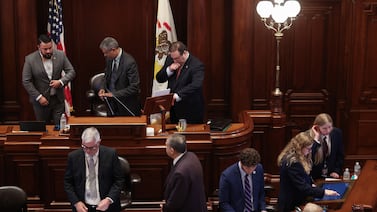This story has been updated to reflect Robin Hood’s involvement.
As New York City’s early childhood sector faces upheaval, Mayor Eric Adams announced Friday the creation of a new office to oversee child care and early childhood education.
The new office, which will be housed within City Hall, was months in the making. It’s charged with overseeing strategy and planning with city agencies that touch early childhood education, including the education department and the Administration for Children’s Services, officials said.
The office’s creation comes as the education department’s own early childhood office has faced intense scrutiny over the past several months under Adams’ leadership.
The city has failed to pay preschool providers on time, leading some to shutter, while Adams has shelved plans to further expand preschool for 3-year-olds as some programs have gone unfilled while others are oversubscribed. The shift spurred City Council hearings and backlash from elected officials and education advocates who had supported the push for universal pre-K for 3-year-olds.
Additionally, Chancellor David Banks’ plan last fall to move hundreds of early childhood workers into new positions — which has so far been paused — resulted in chaos and confusion across the division.
At the same time, the city recently announced an ambitious effort to provide preschool seats for every student with a disability, an issue that former Mayor Bill de Blasio was unable to solve.
The new office is meant to help child care providers cut through so-called red tape, according to a statement from Deputy Mayor Sheena Wright.
It will be led by Michelle Paige, who was chief program and equity officer for University Settlement, which focuses on creating programs, including daycares and preschools, aimed at fighting poverty and inequality on the Lower East Side and Brooklyn. Paige has also worked for Children’s Aid and was an early childhood teacher at the start of her career, according to city officials.
Asked how many people will work under Paige, a City Hall spokesperson said officials are still developing the office’s structure.
The plan to create this new office was nestled into Adams’ “blueprint” for early childhood education published in June. At the time, officials wrote that the office would create “responsive systems that are centered on parent choice, supporting providers, and delivering high-quality options for families” with support from Robin Hood, an anti-poverty nonprofit organization.
Last April, Robin Hood provided a 21-month, $847,000 grant that is supposed to help hire staff and cover other costs for this project, according to a spokesperson with the organization.
Early childhood education organizations applauded the decision to hire Paige and create a new office to oversee the sector.
“With this new office, we hope to see the long-waited-for thoughtful and effective coordination of New York City’s child care sector, ensuring responsive access and support for the city’s families and child care programs,” said Ramon Peguero, president and CEO of The Committee for Hispanic Children and Families, in a statement.
The idea to create the office is “very much needed,” according to a former staffer of the education department’s early childhood division. It’s important for city agencies to coordinate with each other to pull off successful early childhood education programs, since they intersect with multiple offices, said the ex-staffer, who requested anonymity.
Still, details remained murky.
“Obviously, all of us have read the blueprint, but I dont think it’s super clear,” the former staffer said. “What does ‘reaffirming New York City’s commitment to families’ mean? What does it mean for child care, what does it mean for universal child care?”
Reema Amin is a reporter covering New York City schools with a focus on state policy and English language learners. Contact Reema at ramin@chalkbeat.org.






